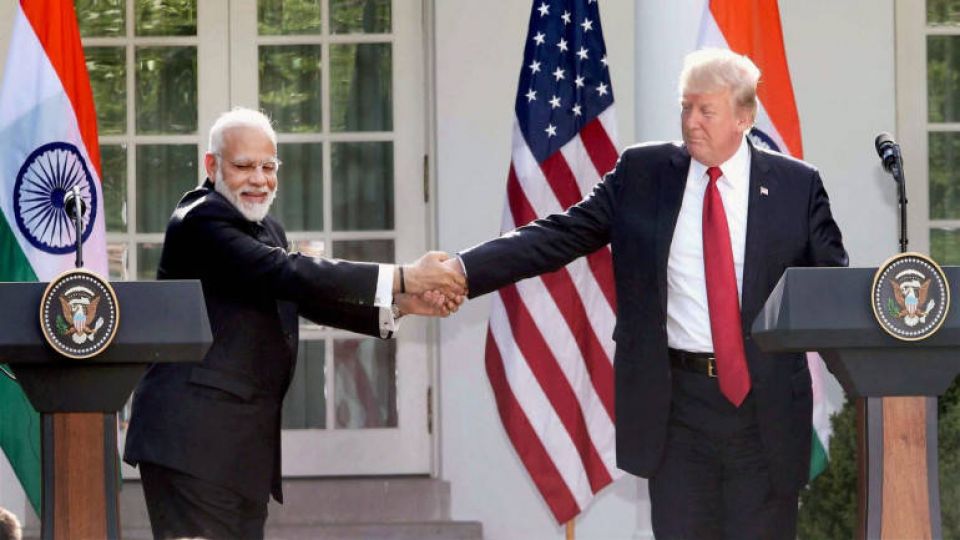May 24, 2019
Modi has tried to cultivate a relationship with US President Donald Trump.
Political and administrative continuity in India signals closer ties with the United States, said India’s Ambassador to the US, Mr Harsh Shringla, after general election results saw Prime Minister Narendra Modi winning a sweeping mandate for a second five-year term.
“What the mandate indicates is a continuity of… commitment to a strong and close partnership, not only between India and the United States but our partnership in the Indo-Pacific region,” Mr Shringla told journalists on Thursday (May 23). “It will inject a new dynamism… seeing stronger partnership on issues such as security, defence and counter-terrorism.”
Hours later, President Donald Trump tweeted: “Congratulations to Prime Minister @NarendraModi and his BJP party on their BIG election victory! Great things are in store for the US-India partnership with the return of PM Modi at the helm.”
In a paper on May 20, when it was already apparent that the ruling Bharatiya Janata Party (BJP) was heading to a win, Dr Ashley Tellis, senior fellow at the Carnegie Endowment for International Peace, wrote: “Modi remains committed to deepening ties with the United States in order to meet the major challenge posed by China and to advance longstanding Indian ambitions within South Asia and globally.”
This is notwithstanding that there are areas of disagreement over, for instance, US tariffs on Indian goods; President Trump’s threat to end Indian privileges under the Generalised System of Preferences; pressure on New Delhi to end oil imports from Iran; and the risk of a possibly hasty US exit from Afghanistan leaving the Pakistan army-backed Taleban space to claw back to power.
But there have been some successes. In a recent – if largely symbolic – success for New Delhi, the United Nations Security Council on May 1 listed Pakistan based Jaish-e-Mohammad (JeM) leader Masood Azhar as a global terrorist as China dropped its longstanding block on the move.
“The shift in China’s position after a decade-long stalemate can be attributed to… the changing geo-strategic dynamics in the Indo-Pacific region and mounting US-China tensions,” Sujan R. Chinoy, director-general of the Institute for Defence Studies and Analysis in New Delhi, wrote on May 23.
Though President Trump has yet to visit India, he is known to get on well with Mr Modi. The White House sees India as a natural partner and one end of its strategy for a “free and open Indo-Pacific.”
India’s Ministry of External Affairs appointed a joint secretary for Indo-Pacific in April. “We are clearly working with our partners to see how we can take the (Indo-Pacific) idea forward, which means greater cooperation, greater outreach to countries that are part of the Indo-Pacific,” Mr Shringla told The Straits Times. “We believe Asean is central to the Indo-Pacific and we need to work closely with our South-east Asian colleagues and our own neighbours.”
Dr Aparna Pande, a research fellow focusing on India and South Asia at the Hudson Institute, told ST: “I don’t see a problem in the defence relationship (between US and India) because there will be continuity on Indo-Pacific, on the Quad, and on China.” The Quad is an informal security dialogue grouping consisting of Australia, India, Japan and the United States.
Problems will arise when it comes down to details, she said. For instance, the Indian Ocean is more important to India than the Pacific.
Afghanistan, Iran and the Middle East are also important. And though India has little option but to stop buying oil from Iran – among the first decisions awaiting the new government – New Delhi would like to continue having access to the strategic Iranian port at Chabahar under a US waiver.
India, however, also struggles to adjust to the quid pro quo style of the Trump administration.
President Trump has pursued a “more transactional approach, attempting to coerce India into complying with US demands on a variety of issues ranging from market access to relations with third countries,” Dr Tellis wrote. This often does not go down well with domestic constituencies in India.
Dr Pande added that while India may not openly complain about the US, there will be a part of the Indian administration which will hedge by, for example, not openly challenging China but having a relationship with it.
“Because they don’t believe it (the relationship with the US) is going to be all in India’s favour.”


